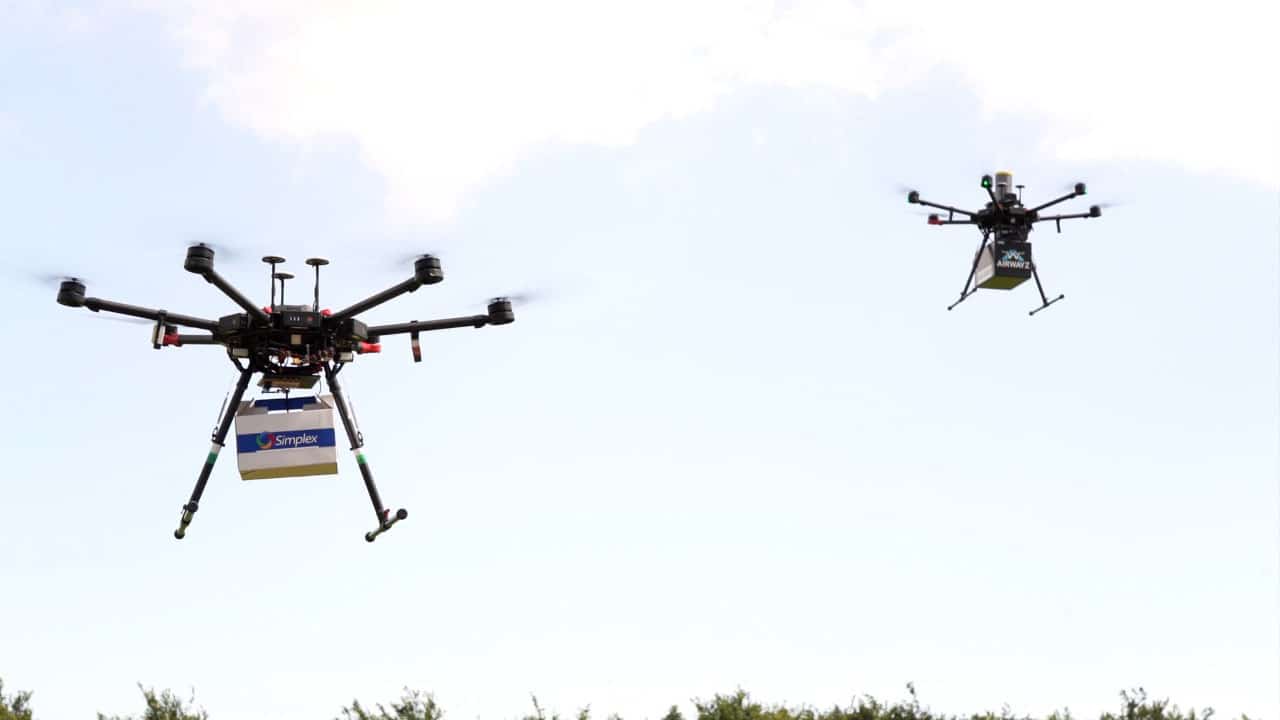 A drone carrying a package for Simplex Interactive. (Raymond Crystal/The Media Line)
A drone carrying a package for Simplex Interactive. (Raymond Crystal/The Media Line) (The Media Line) Your next burger could be delivered by drone.
Israeli company Simplex Interactive is planning to launch a pilot project in Tel Aviv that will see goods purchased online delivered via unmanned aerial vehicle (UAV) by the end of the year.
During a recent demonstration in the northern Israeli city of Hadera, Simplex showed how aerial orders would be delivered to pillar-shaped stations that it plans to set up around Tel Aviv.
According to Shay Levy, founder and CEO of Simplex Interactive, the cost to the consumer will be the same as with traditional delivery methods.
“We’re going to deploy 15 of those [stations] in Tel Aviv, providing actual deliveries for e-commerce purposes,” Levy told The Media Line. “Our goal is to provide customers with the ability to receive their deliveries in approximately 60 minutes.”

Shay Levy, founder and CEO of Simplex Interactive. (Raymond Crystal/The Media Line)
Once a drone reaches a station, it drops the package it is carrying into a box that is secured with a code. An SMS then is sent to the customer’s mobile device, notifying him or her that the package is ready for pick up.
There are several key benefits to making deliveries via air, Levy said.
“First, it’s much greener; second, it’s much faster; and third, it’s much safer for the operators,” he said.
Israel currently is conducting large-scale testing to create a national drone network for commercial deliveries to transport everything from food to medical supplies and equipment.
The Israel Innovation Authority (IIA), together with the Ministry of Transport, the Civil Aviation Authority, and several other government bodies, have launched a pilot program aimed at establishing a safe and functioning commercial drone infrastructure.
The project, part of what is known as the NAAMA Initiative, includes an autonomous Unmanned Aircraft System Traffic Management (UTM) placed in the air traffic control centers of the Ayalon Highway Company in the port city of Haifa.
“In order for us to create the leap from the use of one drone to many drones, we need the drones to communicate [with each other] so that we know how to control the space,” Daniella Partem, head of the Israeli Center for the Fourth Industrial Revolution at the IIA, told The Media Line.
In line with this vision, drones from several companies are regularly flying simultaneously over the city of Hadera, performing roughly 300 flights a day in a designated airspace. Each drone is tasked with simulating the execution of a variety of tasks, such as delivering food or transporting medicine.
The ultimate goal is to revolutionize the future of mobility and airspace management.
“Our goal is to have drones that deliver everything,” Partem said. “Whether it’s food, goods, a shirt … . My vision is to get my coffee in the morning via drone.”
Five different companies currently are taking part in the program, including Simplex Interactive.
Before drone deliveries become routine, however, serious obstacles need to be overcome, among them the cost of operation and ensuring that the sky highway is safe and easy to use.
“We’re not sure when this will be commercial because it has to be economically viable for a company to use a drone” instead of a car or a bicycle, Partem said.
First, it’s much greener; second, it’s much faster; and third, it’s much safer for the operators.
Nevertheless, drone manufacturers are optimistic that the time is ripe for drone deliveries.
“If we can successfully demonstrate that [commercial drone] activity is safe – and won’t harm flights or public safety – things will start to happen,” Ronen Diker, VP Operations at CopterPix Pro, told The Media Line, adding that he believes this will happen “in the near future.”
Headquartered in Kibbutz Karmia near Israel’s border with the Gaza Strip, CopterPix Pro develops and produces specialized autonomous drone systems for the private sector as well as for Israel’s Ministry of Defense.
The startup recently released Drone-in-a-Box, that can be used to patrol facilities and secure perimeters.
“The drone itself weighs less than 300 grams, which means that there is no regulation [permit] required,” Diker said. “The system can thus be deployed everywhere.”
In Israel, drone pilots require a special license to operate any unmanned aircraft that weighs over 300 grams (0.66 pounds).
The NAAMA Initiative is expected to continue over the next two years, with many challenging scenarios set to test the limits of aerial deliveries and prepare for a future where the skies could soon be filled with the buzz of UAVs.























 More news and opinions than at a Shabbat dinner, right in your inbox.
More news and opinions than at a Shabbat dinner, right in your inbox.